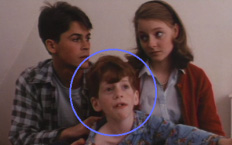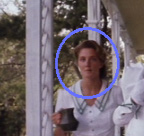|
You probably know that Simon Birch failed miserably as a screen adaptation of "A Prayer for Owen Meany", losing all the complexity and retaining only some mawkish sentimentality and optimism. It's OK to leave the sentimentality, of course, but not JUST that. Irving is a sentimental man, but he's also much more than that. As are we all. The Hotel New Hampshire did a pretty good job at this Herculean translation task, although I'm not sure it didn't get a bit precious at times. For example, the family has a beloved dog named Sorrow. They put him to sleep while one daughter is in the hospital, but one of the brothers steals the dog's body from the vet, and plans to stuff it in order to create a Christmas surprise for his sister. That's silly enough to begin with, but it causes them to deliver plenty of literary double-entendres. When they were taking the dog to be put to sleep, the narration said "but we found that you can't get rid of Sorrow so easily, and none of us knew how soon Sorrow would return". I think maybe that was too obviously literary to be used as a movie narration. The other problem was that the film retained unnecessary sub-plots and characters. Father's father, Iowa Bob the coach, could easily have been eliminated without sacrificing anything integral to the tone or the flow of the story. But I sort of overlooked all the problems, because I felt that the movie somehow got the essence of the book, and created a special literary fairy tale on film, a sensitive and offbeat movie that is unique. It may not be a mass market film, but we need to treasure the unique in a generally formulaic cinema universe. Most of the performers in the film did a good job at making us believe the offbeat characters, and I think you have to give everyone credit for a solid effort except Matthew Modine, who couldn't find a way to connect his obnoxious dual role to reality. Modine ended up wearing a black hat in both roles, but Irving characters need to be nuanced, not Snidely Whiplash villains. Just for fun, identify the young performers making their initial screen appearances. Click on the picture to get the answer.
|
|||||
|
Tuna's comments in
yellow Another film from his books, The World According to Garp, improved with age for me, possibly because the humor was less scatological, and the characters more like people I have met. Technically, the film was well done, but the DVD release has a disappointing lack of special features. Why is it something as inane as The Girl on a Motorcycle has a full-length commentary, and something this odd has not so much as an interview? |
||||
|
|||||


